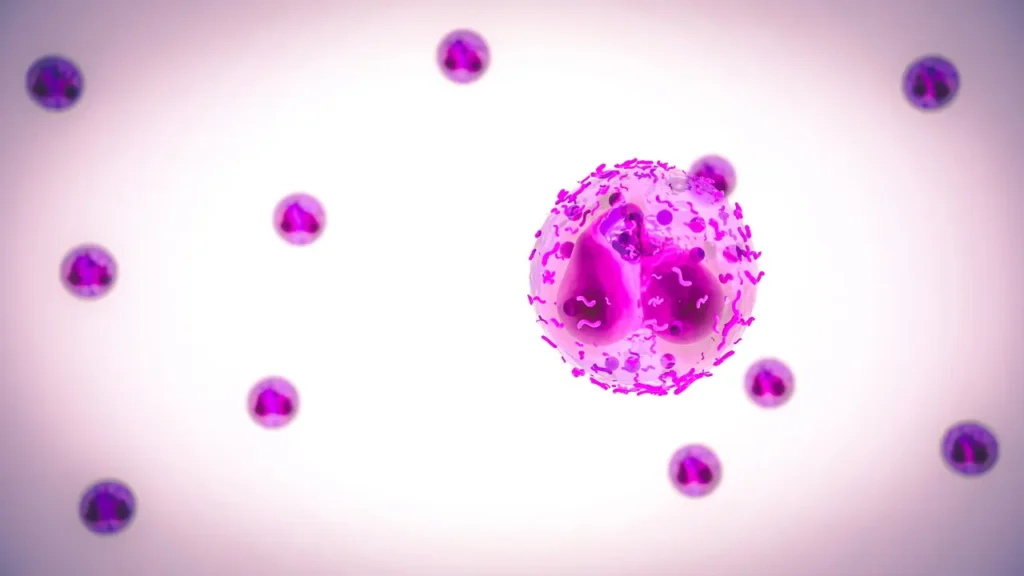Description
The virus termed varicella-zoster virus (VZV), one of the members belonging to the herpes virus family, is what causes chickenpox. It can be spread by direct interaction with an infected person or through respiratory droplets while an infected individual sneezes or coughs. The virus is very contagious. The virus normally needs 10 to 21 days for incubation after exposure before symptoms start to manifest.
Chickenpox is characterized by a rash appearing like a blister that starts on one’s face and torso and moves toward the arms and the legs. Small, red pimples that swiftly turn into blisters packed with fluid characterize the rash’s typical start to how it spreads. The blisters will burst and crust during the span of a few days, ultimately healing entirely in 2-4 weeks. Fever, headaches, and exhaustion are additional typical symptoms and signs of chickenpox.
You May Also Like:
ROYAL BLEND CBD GUMMIES VS PARTNERED PROCESS GUMMIES
AUTOIMMUNE ADDISON’S DISEASE (AAD): DESCRIPTION, CAUSES, AND TREATMENT PROTOCOL
Chickenpox: Description, Causes, And Treatment Protocol is an original (HealthXWire) article.
Possible Causes
As previously stated, the virus varicella-zoster is what causes chickenpox. After an infection, the virus stays dormant in the body and could reactivate later in life, resulting in shingles, which is a different symptom. Despite the fact that chickenpox is very contagious, it typically goes away on its own without any complications. But in some people, particularly those with weakened immune systems, chickenpox can result in catastrophic side effects like encephalitis, pneumonia, or sepsis.
Exacerbating and Mitigating Factors
The following are factors that can make chickenpox symptoms worse:
Weakened Immune System: Patients with HIV or cancer and have impaired immune systems are more prone to experience serious issues.
Age: Compared to children, adults are more prone to have severe symptoms.
Medications: Steroids are one example of a medicine that could impair the body’s immune response and raise the risk of problems.
Pregnancy: Unaffected pregnant women are more likely to experience serious issues that could endanger the fetus.
The following are some of the factors which might mitigate chickenpox:
Vaccination: Children of every age should have the varicella vaccine since it is very efficient at preventing chickenpox.
Isolation: If you are infected, it is important that you be kept apart from others in order to prevent the infection from spreading.
Handwashing: Handwashing frequently can aid in limiting the virus’s ability to spread.

Standard Treatment Protocol
Although there is no known cure for chickenpox, there are a number of options that can assist in treating its symptoms. The following are components of the typical chickenpox treatment regimen:
Antihistamines: Antihistamines can lessen the itching brought on by chickenpox, like loratadine or diphenhydramine. These drugs function by preventing the body from producing histamine, a substance that is released when an allergenic substance or irritant is present.
Anti-viral Medications: Famciclovir, acyclovir, and valacyclovir are examples of anti-viral drugs that may be prescribed to assist with lessenning the duration and intensity of chickenpox. These drugs function by preventing the virus’s ability to reproduce within the body. Usually, anti-virals work best when administered between 24 and 48 hours after the beginning of symptoms.
Pain Relievers: Acetaminophen or ibuprofen, two over-the-counter painkillers, might help with the headache, body aches, and fever brought on by chickenpox.
Calamine Lotion: Chickenpox blisters can produce itchy and inflamed skin, which calamine lotion may help alleviate.
Oatmeal Baths: Baths with oatmeal can relieve itchy skin brought on by chickenpox blisters. A warm bath with colloidal oatmeal added can help reduce inflammation and itching.
Cool Compresses: The irritation and inflammation in the affected regions can both be relieved by applying cool compresses.
Rest and Hydration: The treatment plan for chickenpox includes crucial elements like rest and staying hydrated. Resting helps the human body fight the virus with greater effectiveness, and drinking enough fluids keeps the body from becoming dehydrated, which can be a side effect of chickenpox.

Treatment Options
The following are a few other treatment options for chickenpox that are available alongside the standard therapy:
Nutritional Supplements: There are a few known nutritional supplements that have been used to cure chickenpox, but there is not much scientific data to back them up. However, some of these supplements can increase immunity and speed up recovery. The supplements listed below could be beneficial:
- Vitamin A
The immune system depends on vitamin A, which is crucial for maintaining healthy mucous membranes and skin. Foods like sweet potatoes, liver, spinach, carrots, and kale are all excellent sources of it. By supplementing vitamin A into your body, it can lessen the extent of viral infections, according to some research, but there is not much proof that it works for curing chickenpox.
- Vitamin C
The strong anti-inflammatory and antioxidant properties of vitamin C can significantly improve the immune system. Citrus fruits, kiwi, strawberries, bell peppers, spinach, broccoli, and other vegetables and fruits also contain vitamin C. High doses of vitamin C could potentially lessen the duration and extent of viral infections, according to some research.
- Zinc
A vital element called zinc is important for immune system health. Zinc can be found in foods like oysters, cattle, pork, poultry, beans, and nuts. By supplementing your body with zinc, it can lessen the course of colds along with other viral infections, according to some studies, but there is scant evidence on whether it is useful in treating chickenpox.
- Probiotics
Probiotics can strengthen the immune system, lessen the impact of viral illnesses like chickenpox, and can even shorten their duration. Probiotics can be consumed as a supplement or can be found in fermented foods like yogurt, sauerkraut, and kefir.

Herbal Remedies: Herbal treatments can strengthen the body’s immune system and lessen how severe chickenpox symptoms are. However, some herbal remedies might interact with medicines and have possible negative consequences, so that should be considered before using them. Therefore, it is crucial to speak with a healthcare expert before using any of them. Here are some of the herbal treatments for chickenpox:
Calendula: Due to its potent anti-inflammatory and antibacterial characteristics, calendula has been used in traditional medicine for ages. Applying calendula cream topically can relieve skin irritation and fight infection.
Echinacea: Traditional medicine has used the natural supplement echinacea for treating a number of viral illnesses, including chickenpox. The body’s immune system can positively benefit from it, and the intensity of the symptoms can decrease.
Licorice: A natural supplement called licorice root has been demonstrated to possess anti-viral effects. It can lessen how bad and long the chicken pox symptoms last.
Manuka Honey: A type of honey called manuka honey was recently reported to possess anti-viral and antibacterial effects. It can decrease the incidence of bacterial infections brought on by chickenpox while also soothing the skin.
Essential Oils: Lavender oil and tea tree oil are two examples of essential oils that can assist in reducing the itch and soothing the skin caused by chickenpox. Essential oils can irritate the skin, therefore it is crucial that you adequately dilute them and apply them with care.
Homeopathic Remedies: The duration and extent of symptoms associated with chickenpox can be alleviated by taking some homeopathic medications, like antimonium tartaricum and rhus toxicodendron. In order to document their effectiveness, further study is still necessary. Witch hazel contains an herbal astringent that might soothe irritation and reduce inflammation. Witch hazel can also be used as a compress on the skin or even as a bath additive.
Elderberry: Elderberry remains an herbal remedy that has been used for generations to cure respiratory illnesses such as the flu and colds. It can strengthen the body’s immune system and aid in the management of chickenpox. Elderberry supplements have the ability to lessen the severity and length of the flu and colds, according to some research, but further studies are required to know whether they are effective against chickenpox.

Conclusion
It is crucial to keep in mind that herbal therapies may not be suitable for all and may interfere with other medicines or health issues. Before taking any herbal treatments as a therapy for chickenpox, it is advised to speak with a healthcare professional.
Additional resources for further reference
https://www.mayoclinic.org/diseases-conditions/chickenpox/symptoms-causes/syc-20351282
https://www.aad.org/public/everyday-care/itchy-skin/rash/chicken-pox
https://my.clevelandclinic.org/health/diseases/4017-chickenpox
Important Note: The information contained in this article is for general informational purposes only, and should not be construed as health or medical advice, nor is it intended to diagnose, prevent, treat, or cure any disease or health condition. Before embarking on any diet, fitness regimen, or program of nutritional supplementation, it is advisable to consult your healthcare professional in order to determine its safety and probable efficacy in terms of your individual state of health.
Regarding Nutritional Supplements Or Other Non-Prescription Health Products: If any nutritional supplements or other non-prescription health products are mentioned in the foregoing article, any claims or statements made about them have not been evaluated by the U.S. Food and Drug Administration, and such nutritional supplements or other health products are not intended to diagnose, treat, cure, or prevent any disease.


